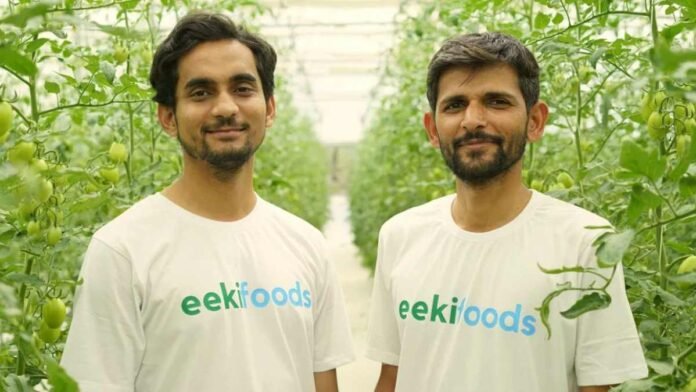Amit Kumar and his friend Abhay Singh co-founded Eeki Foods, a sustainable farming startup. Using hydroponics, the company grows food on a large scale, saving 80% water and 75% faster than that done traditionally.
Amit Kumar and Abhay Singh, who both graduated from IIT Bombay, say that 80 per cent wastage of water can be saved with their technique, with a growth rate of 75% faster than conventional methods. The two friends possess 7 acres of farms in Kota district (Rajasthan), Bundi district (Rajasthan), and Panipat (Haryana), while another 33 acres of land is being built.
Amit and Abhay have created a medium-less way of farming which assists in growing vegetables in a controlled environment. The two are making crores of rupees, annually.
Eeki Foods is a farm that makes use of medium-less way of farming to grow fruits and vegetables in an empty room in a controlled environment. The technique helps in saving 80% of water which would otherwise go to waste. The process requires to fill a vacant chamber with 70% humidity and spraying the roots with the necessary nutrients.
The roots hang in the air without any medium, but with support, and the plant keeps growing. One acre of land yields a monthly 13,500 kg of tomatoes.
The vegetables that Eeki Foods has been growing include cucumber, tomato, chilli, eggplant, pepper, spinach, bitter gourd, bottle gourd, and coriander, and fruits such as watermelons and musk melons. Farm manager at Eeki Foods, Amit, explained the advantage of switching to their organic farming method. He says that organic farming cuts the cost, but also decreases the yield, lowering the farmer’s profits.
Manish Kumar, who also works as farm manager at Eeki Foods, says that the technique is amazing and can provide produce all through the year regardless the fruiting season. As the food grows in a controlled environment inside the chamber, Eeki Foods can suppy fruits and vegetables irrespective of their fruiting season.
Abhay and Amit’s farming method is sustainable and can be used to grow food in all terrains. They have been able to achieve this by growing food with no medium while guaranteeing less wastage. To yield 1% of the required tomatoes, 20,000 acres of fertile land is needed. However, their technique enables them to produce the same on 16,000 acres, and that too on barren land.



